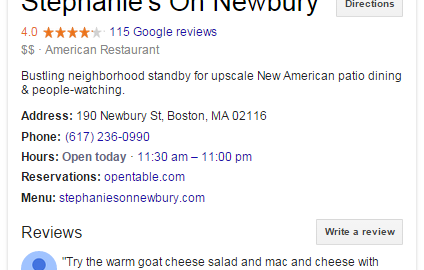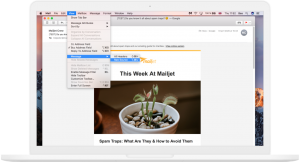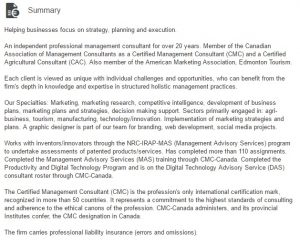Asking me “Should I use AdWords?” is like asking me if you should order dessert. The answer is always yes. I don’t care how full you are, there’s a separate compartment in your stomach for sweets.
But of course I’m going to say yes, I have dessert after every meal (including breakfast), and I love PPC too, so YES is the answer to both inquiries.

But seriously: are there any clear reasons to steer clear of AdWords? Unless your products or offering suck (which I’m sure they don’t), in which case your business is likely to fail regardless, then there are really no reasons not to use the largest search engine in the world, Google, to advertise.
I truly believe that if your company provides a valuable product or offering that has an in-market audience to sell too then there’s no reason you should not be advertising on Google. The thing is it all comes down to dollars and cents. If you’re not doing it right you’re likely not going to see a return. On the other hand if you have a solid team, individual, or combination of both carefully running your PPC strategy then your business growth could double, triple, or quadruple just from the PPC side of marketing. I know this because I’ve seen it happen to many of our clients here at WordStream.
Every industry is different and has its unique challenges, which is what I’d like to explore in this post. Below you’ll find out the challenges and recommended strategy to succeed with AdWords based upon your business model and industry, but first let’s discuss…
Why Should I Pay to Play?
When SEO is free, why should you spend money rather than focusing on appearing in the organic listings? I’ve heard this argument time and time again, but when you take the time to actually understand the difference between the two you’ll realize that relying solely on SEO is unrealistic for long-term business success.
In comparison to PPC, SEO is much harder to control. You can create tons of quality content, optimize your site’s structure to appear in the SERPs (search engine results page), and follow all of the SEO best practices, but placements are still never guaranteed. You also may be getting great organic listings one day, but then when Google decides to shift their algorithm (which they do quite frequently) you could lose that visibility in a flash. There’s also the issue that your competitors are likely paying to play, therefore the chances of you getting listed at the top of the page for free are slim to none. Finally, SEO isn’t actually free! It takes resources to create and optimize quality content on an ongoing basis.

If you’re finding that AdWords traffic is too expensive or that your queries never convert there’s a high chance you’re doing something wrong. I cannot understate the importance of taking the time to learn AdWords and understand concepts like bidding, match types, negatives keywords, and other tools that help you control your budget. You also need to understand landing pages, because even cheap clicks are money thrown in the trash if nobody converts after clicking your ads. The bottom line is that AdWords works. You will get results if you do it right, and this guide should give you some specific tips on how to do that. If you still have doubts, check out this post.
But What If….?
I Wear Multiple Hats
I’m not going to lie, if you wear multiple hats running an AdWords account can be extremely challenging. For the sleep-deprived business owner or the sole digital marketer overseeing a field of marketing campaigns, I wouldn’t recommend relying on AdWords alone. Why? The AdWords interface is not built for the hat-juggler. Digging into the data, optimizing your campaigns, and managing the structure of your account can become a full-time job and eat up the majority of your week. Unless you’re an analytical AdWords wizard who has the time to stay up-to-date on the ever changing PPC space, then you should consider one of the following options:
- Hire a PPC Employee: Take the weight off your shoulders and hire someone tasked with hitting certain PPC metrics, maintaining your account, and gaining new business from your paid ads strategy. This person can also be tasked with running paid ads through other networks like Bing, Facebook, and Twitter, depending on the size of your account. We have a full-time PPC employee at WordStream, and it is not uncommon for businesses to have a dedicated paid acquisition marketer on their team. However, this can be quite expensive and requires making a reliable and quality hire!
- Outsource to a Contractor or Agency: Again, this option can cost a heavy chunk of change. You have to ensure you’re hiring the right person and comfortable with the fact that they don’t know your business like you do. If you decided to go down the outsourcing route spend time doing your research and having conversations to ensure the fit is right.
- Leverage a Software Solution: Typically the cheapest and most efficient option for those who want to “do-it-yourself” in way less time. Tools like WordStream’s 20 Minute Work Week take the hours upon hours of PPC analysis out of the equation and do it for you, while still allowing you the control to accept or reject the suggested optimizations since no one knows your business quite like you do.

I’m a PPC Novice
So you put your ego aside and decided to admit it: your PPC skills are just about as sharp as an infant’s driving skills. Don’t sweat it, we’ve all been there. The first step to mastering PPC is admitting that you need to learn it. You might understand the difference between paid and organic listings, but what about the proper way to structure an account? Or match types and negatives? PPC is not rocket science, and it can be learned for free online. Check out the following resources to become a PPC pro:
- PPC University: A complete school to get the new PPCer up-to-speed on important concepts, with advanced material for those who have mastered the basics. There’s also an app!

- Google AdWords Learn Center: AdWords has a plethora of free learning material, and since it comes from the source you can be sure it’s legitimate.
- PPC Chat: A weekly Twitter Chat where PPC’s smartest people come together for 1 hour of Q&A on Tuesday at 12:00PM EST. This is the place to connect with the smartest people in the industry.
I Have a Longer Sales Cycle
Whether you sell medical software, cars, or insurance, there are a long list of industries that struggle with longer sales cycles. Does that mean steering away from PPC is probably best? Actually, quite the opposite is true. For longer buyer journeys, PPC is a critical component of speeding up slow as molasses sales cycles. Just think about, if there’s multiple touch points during longer journeys, you want to ensure you’re present when the searcher is either starting out or in the midst of their journey (research phase). If you’re not in a prominent place on the SERPs then the searcher will likely go with your competitor. Basically, if you’re not advertising on Google you could be missing out on a converting a huge audience.
Now that we’ve combatted some major concerns, let’s talk about the specific tips, challenges, and strategies for industries when it comes to Google AdWords:
Should You Use AdWords? Tips for Your Industry:
If You’re a SaaS or B2B Business
The B2B/SaaS world comes with its unique challenges including longer sales cycles and niche audiences. PPC might seem like a path to avoid, but many B2B businesses have found that PPC plays a critical role in their lead generation strategy. As long as you’re doing it right, you can succeed with AdWords. Ensure you’re doing the following things to gain AdWords success.
- Conduct keyword research to gain insight on how your audience searches based on where they are in the buying cycle.
- Bid on “problem” keywords and direct your ads to “solution” content.
- Create a custom schedule to ensure you’re advertising during the most profitable hours. For B2B offerings we’ve found that this is typically during working hours Monday-Friday.

- Utilize remarketing and RLSA to re-engage searchers and push them down the funnel.
If You’re in the Retail Space
The biggest challenge for e-comm and retail marketers doing AdWords is the insanely high level of competition. According to Adobe’s Digital Index, retailers spent 47% more on Google’s shopping ads than they did a year ago. But if you’re not advertising on Google, your chances of significantly growing your business are small because people often start shopping with search.

To outsell your competition through AdWords, make sure to:
- Use Google Shopping ads. Shopping ads allow you display an image, price, your brand and even reviews allowing the searcher to get all the information they need before even clicking. This ensures more high-intent clicks, which are generally cheaper then search ads with higher conversion rates.
- Ensure shopping ad images are high quality and prices are accurate.
- Don’t forget about search ads. Text ads are still important for retail marketers because they help raise brand awareness and create repeat buyers.
- Take advantage of automation. Things like ad customizers, dynamic remarketing ads, and ad scheduling will save your life when you’re selling thousands and thousands of products.
- Understand your seasonal peaks and adjust accordingly. If you’re not running higher budget campaigns for events like Black Friday and Cyber Monday then I’d start questioning your career choice.

These tips are just dusting the surface. Check out the full guide to PPC retail marketing tips.
If You’re a Local Businesses
Local businesses need not underestimate the power AdWords can have in driving foot traffic to their storefronts. Whether it be local residents or out-of-towners, people are hopping on Google to find a new restaurant, a dentist office to fix their chipped tooth or a place to buy baby clothes for their friend’s twins. The following things are crucial to gain success in the local PPC space:
- Claim and maintain your Google My Business page. It’s free, easy to manage, and allows you to show your business off on the SERPs in the best light possible. Learn more about Google maps optimization here.
- Ensure your location targeting is accurate within AdWords. Target the most relevant radius to best focus your budget.

- Have a call strategy in place. Calls are critical for location-based businesses so you need to be utilizing call-only campaigns, call extensions, and have a complete mobile strategy in place. You also must track calls to properly optimize your AdWords account.
- Implement all relevant ad extensions (call, location, sitelinks, callouts, etc.) to make it as easy as possible for searchers to gain information through the SERPs.
If You’re in the Legal Industry
“Sixteen years ago all you needed to do was purchase a yellow page ad, and that was it. Nowadays if you don’t spend time on digital marketing, and paid search specifically, you’re not going to make it,” says Jeff Kelly, owner of his own law firm specializing in bankruptcy. “Your business will quickly dry up if you’re not marketing online.”

Folks, you must listen to this wise man. Legal PPC is tough since you’re dealing with some of the most competitive (i.e. expensive) keywords in search, but if people can’t find you on Google then you’re business growth with come to a standstill. To gain AdWords success in this industry make sure to:
- Differentiate yourself from your competition. There’s a lot of it out there, so this is critical. Use actionable calls-to-action, implement ad extensions, and most importantly highlight what makes you better.
- Ensure your ads speak to the searcher’s intent and readiness to hire a lawyer.
- Build trust in your brand. This is so critical for the legal industry because cases are often expensive and stakes are high, so your clientele needs to trust you. To do this provide ample opportunity for leads to call your business, use videos on your landing pages to put a face to the firm, and have an online chat system in place.
Check out the full guide to law firm PPC marketing here.
If You’re in the Travel & Hospitality Industry
Ah, one my favorite industries! Since 74% of both travel and leisure planning occurs online, with the majority starting with search, utilizing Google AdWords is a necessity for those in the business. To maximize your hotel and travel bookings:
- Bid higher on locations, days and hours when people are more likely to book travel.
- Create separate campaigns for each offering and destination.
- Get visual on the display network. Just the image of your location can probably sell itself so why not take advantage by running captivating visual campaigns.
- Expand to Bing. Travel tends do well there.
If You’re in Healthcare
From self-diagnosing (we’ve all done it), sensitive information, language restrictions, and the issue of not being allowed to remarket, AdWords can turn healthcare marketers off, but according to a Google study 90% of hospital administrators rely on search engines to identify vendor and product options and to research features. To foster healthy AdWords performance:
- Get to know your audience well. What keywords will they use to search for when looking for a management software or specific medical equipment? Are there different levels of experience, occupations or personas that you’ll need to target in an alternative manner? Asking questions like this will get you on the right track to running a relevant and successful AdWords campaign.
- Ensure your mobile strategy is top notch. With over 50% of healthcare administrators using their smartphones while making a purchasing decision, this is critical for healthcare PPCers.
- More is always better when it comes to your landing pages. People want a lot of information in order to make a decisions when it comes to their health.
If your industry was left out, check out our best vertical guides or leave a comment letting me know what industry you’d like me to cover next.
Still unsure of whether you should use AdWords? Start off with a smaller budget promoting your highest selling products. Once you’re seeing results, build out your other offerings and keywords groupings to maximize your results. In no time your business will be growing at a faster rate than you ever imagined. Good luck!
Digital & Social Articles on Business 2 Community(70)
Report Post




